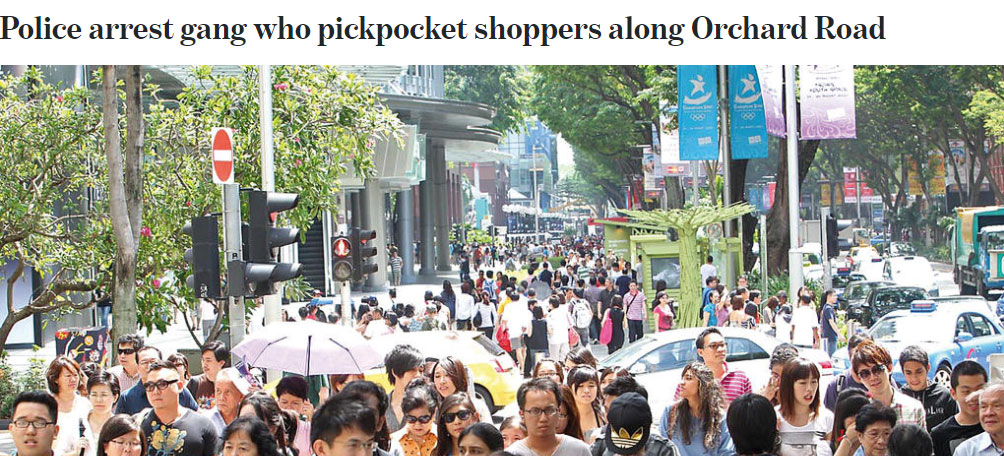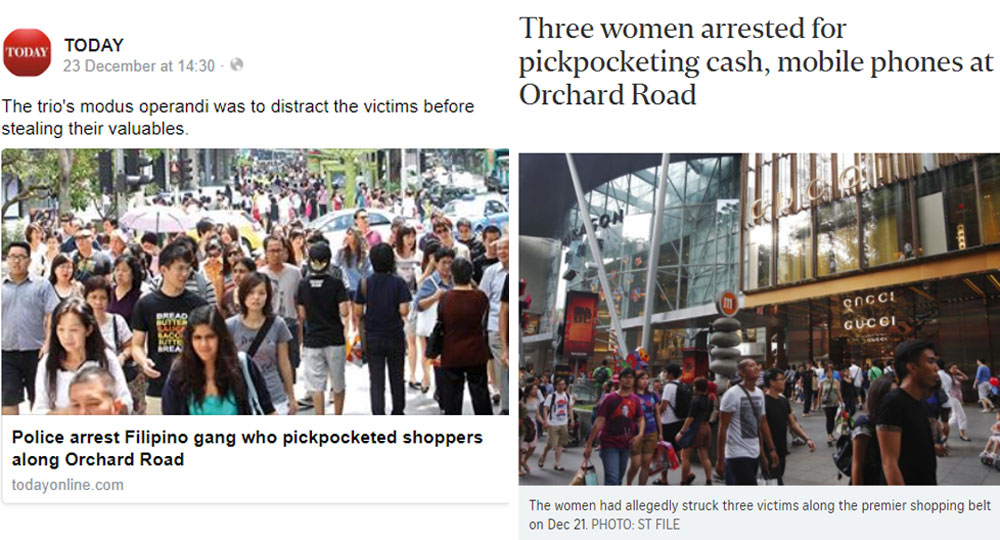The Singapore police arrested three women on Friday, Dec. 22.
The women are suspected to be part of a pickpocket syndicate acting in unison along Orchard Road on Thursday, Dec. 21.
When arrested, three handphones, an EZ-link card, an Internet banking dongle, as well as cash amounting to S$1,117 were recovered. In total, the authorities were alerted to three separate cases of theft.
News of the arrests garnered significant interests in Singapore.
Nationality of culprits
But one detail stood out: The nationality of the culprits.
Its conspicuousness was due to its absence in the various reports.
Out of the three mainstream media publications in Singapore, only Today reported that the female culprits are Filipinos.
[related_story]
Media literacy in action
And a good indication that some media literacy is alive and well in Singapore: In this instance, seasoned news readers actually took noticed of this omission.
Channel News Asia
CNA was the first to break the news at 9.40am on Saturday morning and sharing it on Facebook nine minutes later at 9.49am.
Immediately, CNA readers noticed the missing information, such as the nationality of the pickpockets and chimed in with their own assumptions.



Today
This was followed by CNA's sister publication, Today, sharing the same story at 2.30pm.
However, this article plugged the information gap with an update saying that Today understood that the women arrested are Filipinos.
Today readers were full of praise for the inclusion of this detail.


The Straits Times
ST's report, which came out more than 13 hours late, not only did not add value with any additional new information, but even omitted mentioning the culprits' nationality.
This, naturally, triggered readers:


Why the omission?
It is easy for the public to jump to a conclusion that supports their belief that there is a nefarious intent in omitting certain details, such as nationality, while it is fair game for Singaporeans to be named in news reports for the crimes they allegedly committed.
But there is perhaps a more benign explanation.
The fact of the matter is that the majority of crimes in Singapore are still committed by Singaporeans.
But not all crimes are reported in the media all the time to begin with.
So, if there is already a selective reporting on crime in the media, a selective highlighting of a particular nationality, will then make that particular nationality disproportionately visible.
The narrative then doesn't support the statistics.
The tricky part is, therefore, not giving the impression that foreigners are protected from being named and also not stigmatising one particular nationality.
After all, the narrative is something people remember as it is crystalised, but the statistics are something people don't see.
Which also explains why Today subsequently edited its headline to remove the word "Filipino":

Original URL contains the word "filipino":
![]()
The original headline read "Filipino gang" but has been edited to just "gang".
Is there a compromise?
The purpose of this particular piece of news functions to inform the public of a crime risk during this festive season.
Weeks prior to this period, the authorities could have sounded the alarm bell to remind people in Singapore to stay safe and remain vigilant.
Historically, foreign syndicates coming into Singapore to prey on locals here have been ritually happening over many years, probably due to how populous we are, our complacency and generally safe environment.
So, perhaps some preemptive public service announcement work could have been done beforehand by the authorities by highlighting foreign syndicates, which removes the surprise element in the event such crimes do end up being committed.
If you like what you read, follow us on Facebook, Instagram, Twitter and Telegram to get the latest updates.
